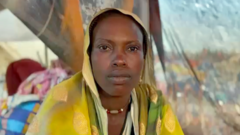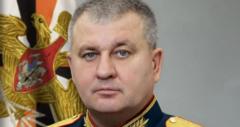As the International Criminal Court (I.C.C.) charges Israeli Prime Minister Benjamin Netanyahu with war crimes, he finds himself in a rare group of sitting leaders under legal scrutiny. Influential global figures like Vladimir Putin and former Sudanese president Omar Hassan al-Bashir have also faced such charges, raising questions about international justice and its implications for global politics.
Netanyahu Joins Ranks of Leaders Charged with War Crimes by I.C.C.

Netanyahu Joins Ranks of Leaders Charged with War Crimes by I.C.C.
Israeli Prime Minister faces International Criminal Court charges, linking him to notable world figures.
In a groundbreaking move, the International Criminal Court (I.C.C.) publicly announced on November 21, 2024, that it has issued an arrest warrant against Israeli Prime Minister Benjamin Netanyahu. This places him alongside a short list of current and former world leaders who have faced similar charges, including Russia's Vladimir Putin and Sudan's deposed president Omar Hassan al-Bashir.
The warrant against Netanyahu comes as part of the court's longstanding mission to hold leaders accountable for war crimes and crimes against humanity. Under the I.C.C.'s statutes, member nations are obliged to arrest individuals for whom the court has issued warrants, although enforcement has often been inconsistent.
Notably, Vladimir Putin has been in the spotlight since March 2023 when the court issued an arrest warrant against him for his alleged role in crimes during Russia's invasion of Ukraine, including the forced deportation of children. Despite these charges, Putin has made various international visits, including a state trip to Mongolia—an I.C.C. member—where he received a warm reception. Additionally, already indicted by the court, Maria Lvova-Belova, the Russian Commissioner for Children’s Rights, has also become a focal point in Putin's international travails.
Another prominent figure linked to the court's warrants is Omar Hassan al-Bashir, the former president of Sudan. The I.C.C. issued arrest warrants for him back in 2009 and 2010, citing genocide and war crimes related to the Darfur conflict. Despite facing international prosecution, al-Bashir traveled to an African Union summit in South Africa in 2015 but was not detained.
Throughout the years, the I.C.C. has also seen other notorious names among its warrants, including the late Libyan leader Muammar el-Qaddafi, who was charged in 2011 just months before his death during an uprising. Interestingly, charges against former Kenyan Deputy President William Ruto were dropped in 2016, after being implicated in post-election violence in 2007 and 2008.
The charges against Netanyahu reflect a complex and evolving international landscape where global leaders are held accountable, creating significant ramifications for international relations and law enforcement. As nations grapple with the obligations set by the I.C.C., the world watches closely to see if compliance will be achieved this time around.
The warrant against Netanyahu comes as part of the court's longstanding mission to hold leaders accountable for war crimes and crimes against humanity. Under the I.C.C.'s statutes, member nations are obliged to arrest individuals for whom the court has issued warrants, although enforcement has often been inconsistent.
Notably, Vladimir Putin has been in the spotlight since March 2023 when the court issued an arrest warrant against him for his alleged role in crimes during Russia's invasion of Ukraine, including the forced deportation of children. Despite these charges, Putin has made various international visits, including a state trip to Mongolia—an I.C.C. member—where he received a warm reception. Additionally, already indicted by the court, Maria Lvova-Belova, the Russian Commissioner for Children’s Rights, has also become a focal point in Putin's international travails.
Another prominent figure linked to the court's warrants is Omar Hassan al-Bashir, the former president of Sudan. The I.C.C. issued arrest warrants for him back in 2009 and 2010, citing genocide and war crimes related to the Darfur conflict. Despite facing international prosecution, al-Bashir traveled to an African Union summit in South Africa in 2015 but was not detained.
Throughout the years, the I.C.C. has also seen other notorious names among its warrants, including the late Libyan leader Muammar el-Qaddafi, who was charged in 2011 just months before his death during an uprising. Interestingly, charges against former Kenyan Deputy President William Ruto were dropped in 2016, after being implicated in post-election violence in 2007 and 2008.
The charges against Netanyahu reflect a complex and evolving international landscape where global leaders are held accountable, creating significant ramifications for international relations and law enforcement. As nations grapple with the obligations set by the I.C.C., the world watches closely to see if compliance will be achieved this time around.



















